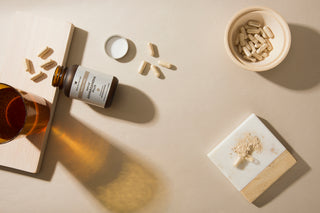
- What is the perimenopause?
- How does the menopause differ from the perimenopause?
- What are the symptoms of perimenopause?
- When does perimenopause start, and how long does it last?
- What supplements should I be taking during perimenopause?
This week we speak to Marianne Grechko, Nutritional Therapist (DipNT) at Wild Nutrition about how to help your body during perimenopause and the lifestyle changes you can implement to support your nutritional & emotional wellbeing during this natural transition.
What is perimenopause?
Perimenopause is the natural beginning of menopause known as the menopausal transition stage. During this time, women may have regular or start having some irregularities in their cycle. This happens due to changes in hormone levels like oestrogen, follicle stimulating hormone (FSH) and luteinising hormone (LH). Fluctuation in these hormones eventually lead to menopause. As the woman’s ovaries significantly reduce oestrogen production, this leads to a number of perimenopause-related symptoms.
How does perimenopause differ from menopause?
Perimenopause is the transitioning stage of menopause during which menstruation slowly fades and the woman is moving from child bearing years into so called ‘soul development’. During perimenopause women are still menstruating but it may start to experience irregularity and PMS type of symptoms. Once a woman has missed a period for 12 months consecutively she is officially considered to have moved into menopause.
What are the symptoms of perimenopause?
Every woman experiences perimenopause differently, but there are common symptoms of perimenopause. These symptoms include irregular periods than usual, breast tenderness, hot flushes, night sweats, weight gain, changes in hair quality, increased heart rate, headaches, problems with concentration, muscle aches, declining sex drive, fertility problems, urinary tract infections, and so on.
When does it start and how long does it last?
Perimenopause is a natural process and should not be feared. Perimenopause can start as early as mid 30’s and last for up to 10 years before menopause is reached. Average age for perimenopause is mid 40’s. Women can still become pregnant and have a child during their perimenopause years.
How to support the body with Wild Nutrition supplements?
-
Botanical Menopause Complex has been expertly formulated to nurture and support this process from the initial mild changes of perimenopause until after menopause. A selection of herbs and magnesium helps with the common symptoms of this process.
This product contains:
- Dong Quai, an effective oestrogen modulating herb helping to decrease hot flushes, sleep disturbances and fatigue.
- Ashwagandha is an ‘adaptogenic’ herb to assists our stress response via the pituitary and adrenal axis.
- Turmeric also included in the Botanical Menopause support phase 2 liver detoxification, essential when supporting hormone metabolism and balance.
- Vitamin B Complex is an important support for our adrenal glands. Once oestrogen production declines from the ovaries, the adrenals become central in producing a type of oestrogen used for bone density and brain health.
- Our KSM-66 Ashwagandha Plus has been shown to promote the reduction in stress hormones such as cortisol, normalise thyroid hormones and support poor sleep. Ashwagandha is an important herb for mood balance, alleviating anxiety and depression.
- Wild Nutrition Food-Grown Magnesium during perimenopause is key for heathy bone density & cardiac support. As ‘natures tranquiliser’ magnesium has been shown to support feelings of stress/anxiety.
How to support the body with lifestyle changes?
- Consider a well-supported detoxification programme to support elimination and detoxification channels to maintain a healthy clearance of hormone metabolites, especially when transitioning into menopause.
- Stress can have a significant influence on your experience of the perimenopause. Create time for hobbies and relaxation. Take time to go for a massage or a facial. Practice yoga and grounding to reduce stress.
- Be mindful of environmental oestrogens that may act as harmful hormone disruptors. Minimise plastics and synthetic chemical cosmetics and household cleaning products. Choose glass and crockery for cooking. Use pots or frying pans made of steel or non-toxic cookware. Smoking can lead to earlier onset of perimenopause, consider giving up.

